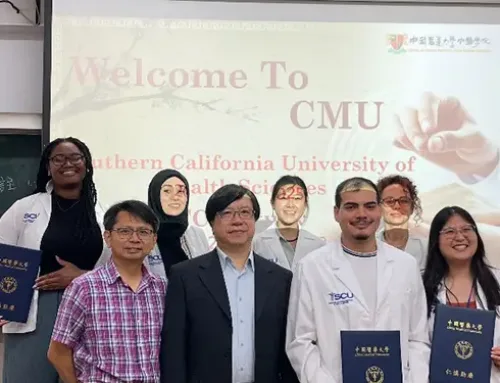Online Acupuncture Programs: The Best Distance Learning Options Reviewed

An online acupuncture school can offer a flexible, accessible route into a field that blends traditional medicine with growing demand in modern healthcare. With hybrid learning models on the rise, students now have more options to complete rigorous training while balancing work, family, or location limitations.
But choosing the right program requires more than convenience. Accreditation, clinical experience, faculty expertise, and curriculum design all shape your education—and your ability to practice. Some programs are thoughtfully structured to prepare students for licensure and real-world care. Others may lack the depth or support you’ll need to succeed. Understanding how today’s best programs are built can help you make a smart, informed decision.
Can You Learn Acupuncture Online? Here’s How It Works
Online acupuncture programs don’t mean skipping hands-on training. Most follow a hybrid model that combines digital learning with essential in-person experience. Knowing how this format works helps students choose a path that fits their goals, schedule, and lifestyle.
What “Online” Actually Means in Acupuncture Education
In the world of acupuncture, “online” usually refers to hybrid programs. These programs combine online academic coursework with in-person clinical and lab requirements. Students typically complete theoretical studies—like biomedicine, diagnostics, and Chinese medicine foundations—through structured digital platforms.
Practical training, including supervised clinic hours, technique labs, and hands-on assessments, takes place at designated campus locations or approved partner sites. This format allows students to learn flexibly without giving up the immersive experiences required for licensure.
Structure: What to Expect from a Hybrid Program
Here’s how most hybrid acupuncture programs are organized:
- Online coursework: Covers theory, diagnostics, herbal studies, anatomy, and physiology
- In-person lab intensives: Held on campus or regional sites to build practical skills
- Clinical rotations: Required for graduation and licensure, completed in approved clinics under supervision
This structure supports both independent study and community-based learning, helping students stay engaged, connected, and on track throughout the program.
What to Expect from the Curriculum in a Hybrid Acupuncture Program
An online acupuncture school prepares you for hands-on clinical practice while giving you a strong academic foundation. You’ll study everything from Eastern diagnosis techniques to modern anatomy, developing the skills to treat, communicate, and thrive in today’s healthcare landscape.
Eastern Foundations
You’ll begin with the core principles of Traditional Chinese Medicine. Students gain a deep understanding of meridian theory, the body’s energy systems, and diagnostic methods like pulse and tongue analysis. Herbal medicine is a key focus, including traditional formulas, therapeutic actions, and safety considerations.
Western Integration
To work confidently in clinical and collaborative settings, you’ll study key biomedical sciences. This includes anatomy, physiology, pathology, pharmacology, and an introduction to diagnostic imaging. The goal is to help you connect Eastern diagnostics with Western clinical language and tools.
Clinical Skills
Clinical skills are a central part of your training, developed through hands-on experience and direct supervision. These competencies are introduced early and refined across your clinical rotations, preparing you to deliver safe, effective, and personalized care. Key skills include:
- Acupuncture point location and needle technique
- Herbal compounding and patient-specific formulations
- Developing and adjusting treatment plans across conditions
Each skill is supported by structured feedback from licensed supervisors, helping you build both confidence and clinical precision as you progress through the program.
Mind-Body Tools
Some programs incorporate movement-based modalities that complement treatment and support long-term wellness. You’ll be introduced to Qigong, Tai Chi, and other therapeutic movement practices. These can become part of your own health routine or be recommended to patients.
Professional Preparation
Beyond clinical technique, you’ll learn how to document care, communicate effectively, and uphold ethical practice. These areas help you build trust with patients and ensure you’re prepared to work in regulated, professional healthcare environments.
Business Skills
If your program includes practice management training, you’ll cover essential skills like setting up a clinic, navigating billing and insurance systems, and understanding legal requirements. These tools are especially helpful if your goal is to open or run a practice after graduation.
What to Look for in a Top Online Acupuncture School
If you’re exploring options for an online acupuncture school, it’s important to know what to look for. Flexibility matters, but so do accreditation, clinical experience, and learning design. The right program prepares you for licensure and real-world success.
Accreditation
Accreditation is non-negotiable. A strong program will be accredited by the Accreditation Commission for Acupuncture and Herbal Medicine (ACAHM). This ensures your eligibility for licensure exams like the NCCAOM or CALE, depending on where you plan to practice. Without ACAHM recognition, your degree may not qualify you to take required board exams.
Clinical Experience
Hands-on clinical training should be a core part of the curriculum. Look for programs that offer in-person supervised rotations across a variety of patient settings. Clinics should reflect real-world environments, not just simulated labs. Strong programs also begin clinical exposure early, often within the first or second year—not near the end.
Interactive, Not Passive, Online Learning
An effective learning environment does more than deliver content. The best online programs use platforms that are built for real engagement. This can include video demonstrations, interactive case studies, and group discussion boards. Some even offer virtual reality or simulation labs to help reinforce hands-on concepts.
Seamless Pathways for Advancement
Programs that offer a clear academic progression—from a master’s to a doctorate—can save time and cost for students who want to continue their education. A built-in doctoral track, with no need to reapply or duplicate coursework, gives you options without making you start over.
Where Tradition Meets Innovation: Acupuncture Program at SCU
At SCU, we’ve built our master’s and doctoral acupuncture programs around a balanced, integrated curriculum. You’ll study classical Eastern frameworks like meridian theory, herbal medicine, and TCM diagnostics alongside anatomy, pathology, diagnostic imaging, and evidence-informed care. Our goal is to prepare you to practice confidently in private settings, interdisciplinary clinics, and collaborative healthcare teams.
Start Clinical Training in Year One
Hands-on experience begins early. In your first year, you’ll start seeing patients at SCU Health Clinics, gaining confidence and skill in real clinical environments. As your training continues, so does your exposure. Our students rotate through a range of care settings—including hospital partnerships like Children’s Hospital of Orange County (CHOC), where they experience acupuncture in an advanced integrative care model.
Technology-Enhanced Learning That’s Actually Engaging
We don’t treat technology as an add-on. We use it to bring the material to life:
- Complete Anatomy: 3D anatomy learning that gives you a clear visual understanding of body systems
- SynDavers: Synthetic human models for practicing safe and effective needle technique
- DITKI: Interactive, video-based learning platform designed to simplify complex topics
- Diagnostic Imaging: Learn to interpret scans and imaging to better support diagnosis and treatment planning
These tools reinforce what you learn in class and prepare you to apply it in the clinic.
Flexible Entry, Seamless Progression
Students come to SCU from many backgrounds, so we’ve made our program accessible and efficient. You can apply with 90 or more qualifying college credits, even without a bachelor’s degree. If you’re starting from scratch, our undergraduate Health Sciences program provides a direct path into the master’s track.
And if you’re already earning your master’s with us, the transition to our doctoral program requires just 16 additional credits—no need to repeat coursework or reapply.
Begin Your Future in Acupuncture Today
Exploring options for an online acupuncture school is a great first step—but it’s just the beginning. At SCU, our hybrid programs combine Traditional Chinese Medicine with modern clinical sciences, early hands-on training, and flexible pathways for growth. We prepare students to meet today’s healthcare demands with clarity, skill, and purpose.
If you’re ready to train with faculty who care, in a university setting designed to support your goals, we’d love to meet you. Take a look at our admission requirements and apply today.
FAQs
Can I get licensed if I attend an online acupuncture school?
Yes, if the program is accredited by the Accreditation Commission for Acupuncture and Herbal Medicine (ACAHM). Accreditation ensures you’re eligible for licensing exams like the NCCAOM or CALE, depending on your state.
How much of an acupuncture program can actually be completed online?
Most programs follow a hybrid model: academic coursework online, clinical hours in person. Online learning typically covers theory, diagnostics, and biomedicine, while labs and clinical rotations are hands-on.
What’s the difference between a master’s and doctoral degree in acupuncture?
Both qualify you for licensure. The doctorate includes more advanced training in biomedicine, research, and clinical leadership—ideal if you’re pursuing teaching, hospital roles, or deeper specialization.
Can I start SCU’s acupuncture program without a bachelor’s degree?
Yes. Students can apply with 90 or more qualifying college credits, or enter through our Health Sciences undergraduate program and transition into the master’s track.
How soon will I begin clinical training at SCU?
Students start clinical training in their first year at SCU Health Clinics, building hands-on experience early and continuing through a variety of real-world settings.
Related Posts




